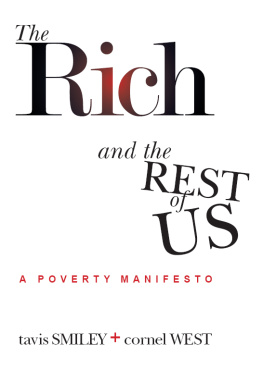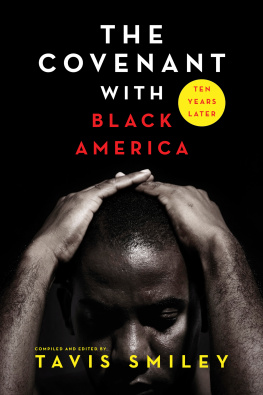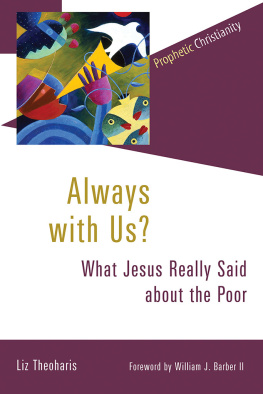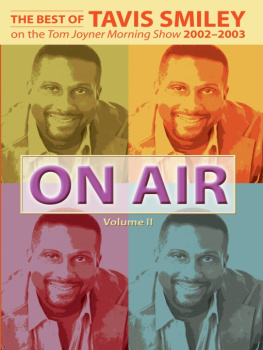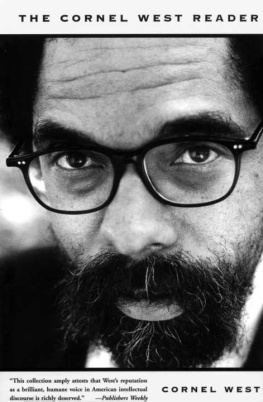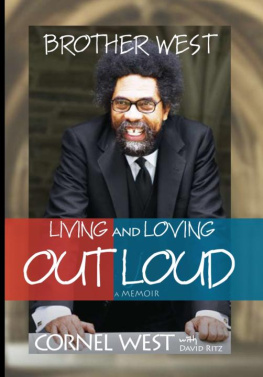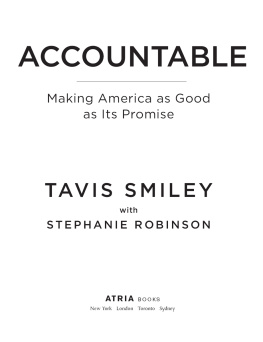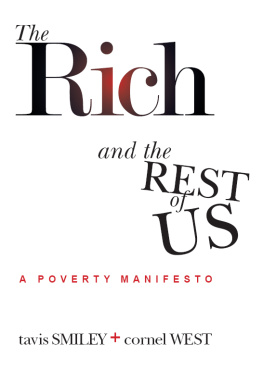The Rich
and the Rest of Us

Copyright 2012 by Tavis Smiley and Cornel West
Published in the United States by: SmileyBooks, 250 Park Avenue South, Suite #201, New York, NY 10003 www.SmileyBooks.com
Distributed in the United States by: Hay House, Inc.: www.hayhouse.com Published and distributed in Australia by: Hay House Australia Pty. Ltd.: www.hayhouse.com.au Published and distributed in the United Kingdom by: Hay House UK, Ltd.: www.hayhouse.co.uk Published and distributed in the Republic of South Africa by: Hay House SA (Pty), Ltd.: www.hayhouse.co.za Distributed in Canada by: Raincoast: www.raincoast.com Published and distributed in India by: Hay House Publishers India: www.hayhouse.co.in
Cover design: Juan Roberts/Creative Lunacy
Interior Design: Cindy Shaw/Creative Details.net
Grateful acknowledgment is made for permission to reprint previously published material: John Scalzi, excerpt from Being Poor. Reprinted with permission. http://whatever.scalzi.com/2005/09/03/being-poor/
All rights reserved. No part of this book may be reproduced by any mechanical, photographic, or electronic process, or in the form of a phonographic recording; nor may it be stored in a retrieval system, transmitted, or otherwise be copied for public or private useother than for fair use as brief quotations embodied in articles and reviewswithout prior written permission of the publisher.
The opinions set forth herein are those of the authors, and do not necessarily express the views of the publisher or Hay House, Inc. or any of its affiliates.
Library of Congress Control Number: 2012934043
Tradepaper ISBN: 978-1-4019-4063-8
Digital ISBN: 978-1-4019-4064-5
14 13 12 11 4 3 2 1
1st edition, April 2012
Printed in the United States of America
For poor people in America


If we think we have ours and dont owe any
time or money or effort to help those left behind,
then we are a part of the problem
rather than the solution to the fraying
social fabric that threatens all Americans.
Marian Wright Edelman
Sometimes, we cant help but marvel at this blessed, collaborative journey were on together. It is rare indeed when a philosopher from the halls of academia and a broadcaster from the public arena can become one voice, one mind, and one heart committed to raising consciousness aboutas our mutual hero Dr. Martin Luther King, Jr. so eloquently phrased itthings that matter.
We have traveled thousands of miles together, conducted countless media interviews together; weve sat in homes, walked through communities, and spoken at town hall meetings together. And now, here we are, collaborating on our first book together on a subject that matters to us deeply.
We are concerned about poverty in America because it has impacted our lives, our outreach, the missions weve embraced, and our roles as democratic thinkers.
For my dear brother, Tavis, poverty is not an abstraction; it was the story of his childhood. He didnt grow up associating poverty with Black ghettos, run-down barrios, or slums. Tavis, the oldest of ten kids, grew up in a Bunker Hill, Indiana, trailer park with mostly poor whites. His working-poor, struggling parents, Emory and Joyce Smiley, and his grandmother (Big Mama) ran a strict Pentecostal household in a space that wasnt built for 13 people. When Taviss aunt was murdered, the Smiley home became the safety net for her four children. He still recalls the humiliation of going to school in hand-me-down clothes and shoes with cardboard stuffed in them to cover the holes in the soles. His success today did not, perhaps cannot, erase the imprint of poverty from his psyche.
Poverty matters deeply to my abiding friend, philosopher, and Princeton University Professor, Dr. Cornel West. His father, Clifton L. West, Jr., a contractor for the U.S. government; and his mother, Irene B. West, a teacher and later a pioneering school principal, were actively involved in the early Civil Rights Movement. Often, when reflecting on his formative years, Doc tells me he was inspired by the sincere black militancy of Malcolm X, the defiant rage of the Black Panther Party, and the Black theology of James Cone. As student-body president at John F. Kennedy High School in Sacramento, California, Doc organized protests demanding Black studies courses at his and other local high schools, as well as marched in civil rights demonstrations. Doc has been a champion for racial and social justice since childhood. Grounded in the traditions of the Black Baptist Church and music, Doc has always been concerned about fighting poverty both at home and around the world.
Poverty matters to us because it mattered to Dr. King. Our work and witness are inspired by his words, I choose to identify with the underprivileged, I choose to identify with the poor, I choose to give my life for the hungry, I choose to give my life for those who have been left out of the sunlight of opportunity. For us, ending poverty is squarely rooted in the legacy of a King who fought against poverty until his dying day on April 4, 1968. Lest we forget that, Dr. Kings final trip, his final mission, was to go stand beside the poor sanitation workers in Memphis who were fighting for better wages, bargaining rights, and safer working conditions. Dr. Kings last battles involved the eradication of poverty.
In 2011, we launched Smiley & West, a weekly program from PRI that gave us the opportunity to take some of our private dialogue to public radio. We envisioned a down-to-earth format with real-people conversations similar to the ones heard at the local coffee house, cocktail party, barbershop, or beauty salon. To that end, a portion of the show is called, Take Em To Task. Its a segment where listeners call in to turn the tables on us and ask questions or challenge the ideas, issues, and actions we pursue.
Edith was one of those Take Em To Task callers who challenged our position on poverty. Shed heard us preach about it, complain about it, and challenge politicians and other leaders who we felt either made it worse or werent doing or saying anything at all about it.
Well, Edith asked us, what are you two prepared to do about it?
It was a question we took to heart. We asked ourselves, What more can a philosopher and broadcaster do about poverty? The answer was surprisingly simple. Do what we do bestuse our public platforms to raise consciousness and raise the issue of poverty higher on the American agenda.
With our mutual passions stoked, we made the decision to inaugurate The Poverty Tour: A Call to Conscience, an 18-city bus tour that began on August 6, 2011, designed to highlight the plight of Americas poor of all races, colors, and creeds.
Although several major media outlets credited us in 2011 for helping to place poverty on the national agenda, our intent wasnt to be first out of the gate on this issue. Our goal was to put a human face on poverty so that the persistent poor, near poor, and new poor will not be ignored or rendered invisible during this unprecedented wave of economic downturn. At this juncture, it was clear to us that too often people werent connecting the dots between the new face of American poverty and the extraordinary decades-long increase in wealth inequality in the American economic system. The Great Recession and the avalanche of home foreclosures that followed are only one part of the story. We believe that to do more, you have to know moremore of the truth.
Next page
